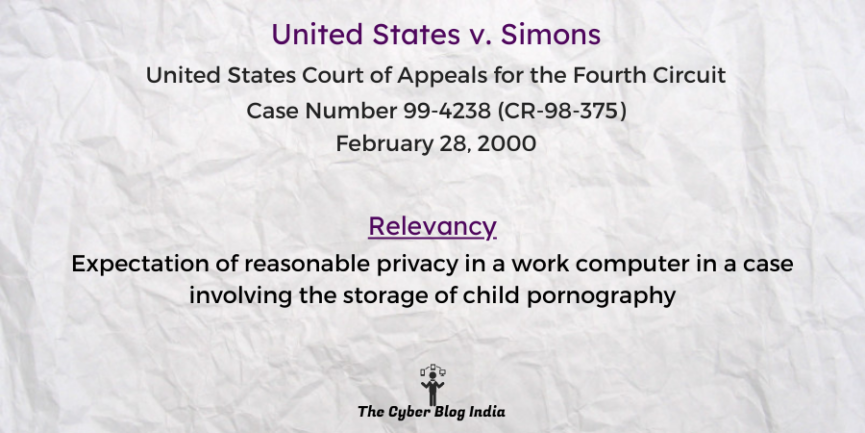United States v. Simons

United States v. Simons
206 F.3d 392, 398
In the United States Court of Appeals for the Fourth Circuit
Case Number 99-4238 (CR-98-375)
Before Circuit Judge Wilkins, Circuit Judges Niemeyer and District Judge Seymour
Decided on February 28, 2000
Relevancy of the case: Expectation of reasonable privacy in a work computer in a case involving the storage of child pornography
Statutes and Provisions Involved
- Certain activities relating to material constituting or containing child pornography, 18 USC § 2252A
Relevant Facts of the Case
- The Central Intelligence Agency (CIA) employed Simons as an electronic engineer at the Foreign Bureau of Information Services (FBIS), giving him access to an office and Internet-enabled computer.
- In 1998, FBIS implemented a policy restricting internet use for official purposes and prohibiting access to illegal content.
- FBIS contracted Science Applications International Corporation (SAIC) to monitor its computer network for unauthorised use.
- On July 17, 1998, SAIC manager Mauck tested a new firewall database for the keywords “sex” and found numerous internet hits linked to Simons’ computer.
- Mauck reported his findings to FBIS contact Camer, prompting an investigation. Harper, another employee, physically removed Simons’ hard drive as part of the investigation.
- The District Court ruled Simons had no privacy expectation for his internet use and approved the warrantless searches under the Fourth Amendment.
- Simons was found guilty and sentenced to 18 months for possession of child pornography.
Prominent Arguments by the Counsels
- The appellant’s counsel argued that the warrant was invalid for the zip drive and zip drive diskettes because the affidavit supporting the warrant application contained a deliberately misleading statement. The statement falsely claimed that Simons had attached a zip drive to his computer. The appellant’s counsel further argued that the search conducted under the August warrant violated Simon’s constitutional rights.
Opinion of the Bench
- Remote searches of Simons’ computer and FBIS’s retrieval of the hard drive from his office did not violate his Fourth Amendment rights. He lacked a legitimate expectation of privacy in internet-downloaded files.
- The defendant’s subjective belief that the files he downloaded from the Internet were private is unreasonable. FBIS had previously notified him about monitoring and overseeing his internet usage.
- The August search warrant was valid, and the Rule 41(d) violation did not make the search unconstitutional.
Final Decision
- The court partly affirmed the District Court’s order and remanded it for further proceedings.
Sreekutty R, an undergraduate student at National Law University Odisha, prepared this case summary during her internship with The Cyber Blog India in May/June 2023.
